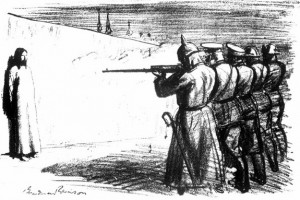Shortly before graduating from Biola University in the Spring of 2008, I took a job working as a part-time pastor at a new, predominantly Korean, inner city church plant in Los Angeles. A couple months into the job, I found myself in Buffalo, New York for our denominations’ annual conference. I still cannot forget a conversation that I had—along with two other colleagues—with a certain Army chaplain. Talk about a collision of Christian worldviews. Here were three inner-city L.A. guys talking to an old school conservative fundamentalist Army chaplain. The topic of conversation inevitably turned toward politics. At the time I didn’t realize it but there was a one-kingdom v. two-kingdoms clash of ideas occurring around that restaurant table. Somehow the topic of political candidates religious views came up. This chaplain argued that the faith background of a political candidate is diabolically important. More directly, you should only vote for Christian political candidates who will allow the bible to shape their politics. I will never forget our lead pastor Alex asking this man the following question, “If you had five Christians, five Hindus, five Buddhists, five Muslims and five Jews, how would you go about starting a country?”
Something about the question struck me. Surely, you can’t use the Bible to create a political consensus with men of such different faith backgrounds. Any attempts to do so would be futile. So what consensus can we rally around? I want to suggest that in any society where divergent religious beliefs are to be found (read: all societies), it only makes sense to rally around the one thing which all men acknowledge, natural law. If we conclude that natural law is to be the basis by which civil societies are constructed, then this largely makes varying faith backgrounds irrelevant. Or to put it another way, Mitt Romney’s Mormonism is irrelevant.
For many evangelicals, there is a real conflict over whether they should vote for a Mormon candidate. This has been documented in numerous places. Back in 2008, Washington Monthly published a piece entitled, “Mitt Romney’s Evangelical Problem.” Recently, Washington Post writer Michael Gerson took up the topic once again. I prefer not to be the defender of all things Romney. Truth be told, I can’t stand him as a political candidate. However, I do feel a need to provide a different perspective against this very mainstream evangelical viewpoint. At its very core, this is a one-kingdom v. two-kingdom discussion and thus I would like to show how a two-kingdom framework leads me to an opposite conclusion about faith and politics. In fact, it is my two-kingdoms belief that leads to believe in the legitimacy of political pluralism.
Perhaps it is best to make this point through the reestablishment of certain biblical principles that I have argued for throughout this two-kingdoms series. The first point is that of contrasting covenants in the book of Genesis. In a previous article, I argued that in the Noahic covenant, God set up a covenant of commonality. This means that the Noahic covenant effectively established what two-kingdom theologians call, the civil kingdom. It is a kingdom where men of all faith backgrounds are to converse, interact, trade, etc. It is important to note that the Noahic covenant is a covenant that is made with all mankind (Genesis 9:9), not just with a people of specific religious allegiance to God. This covenant of commonality deals entirely with non-redemptive matters. All the key stipulations of the covenant relate to how man lives amongst one another in a fallen world (Gen 9:6,7,15). Note that none of the covenant stipulations relate to religious particularities. There are no “religious” pre-requisites for successfully carrying out the various demands of the Noahic covenant. This truth shows us something important. It shows us that one may live in the civil kingdom and fulfill God’s purposes in the civil kingdom without having to subscribe to a certain set of religious principles. While this ability is of no relevance from a salvific standpoint, it is crucial for understanding life in the civil kingdom.
The second point to be made is that there is a law, which all men are captive to through their own conscience. In Romans 2:14-15 we read, “For when Gentiles, who do not have the law, by nature do what the law requires, they are a law to themselves, even though they do not have the law. They show that the work of the law is written on their hearts, while their conscience also bears witness, and their conflicting thoughts accuse or even excuse them…” All men have the law written on their hearts. Therefore, in the civil realm, men of diverse religious backgrounds can come to agreement on crucial matters such as abortion or homosexuality.
If this is in fact the case, then it makes the need for a politician to be a Christian completely unnecessary. Among the most important things that count in a politician are personal integrity in accordance with the nature of things and political positions that uphold the natural order. An ability to uphold God’s plan for society is not dependent on religious persuasion.
This belief was held by none other than John Calvin himself. Irena Backus remarks in her piece Calvin’s Concept of Natural Law and Roman Law that:
Calvin separates natural moral law from biblical precepts and makes it stand for innate knowledge of right and wrong. It is this innate knowledge that enables nations who do not know the Bible to have legal systems. Therefore by removing natural law in all its expressions from the purview of the church, Calvin automatically puts it in the purview of rulers and magistrates, in other words in chief civil legislators…Calvin never suggests that God gave civil law. What he does affirm is that it stems from the sole universal God-given law—natural law—in other words, “notions of justice and right, which the Greeks call prolepseis, naturally engendered in men’s minds.” These notions mean that even nations that do not have the law of God can and do participate in divine legislation and demonstrate this by their system of civil legislation.
At least, in Backus’ understanding, Calvin did not see the Christian persuasion as something necessary to be an outstanding politician.
The fusion of the two-kingdoms framework and natural law provides a backdrop in which religious pluralism can be embraced by Christians. It allows us to analyze political candidates from a different perspective. A perspective in which Romney’s Mormonism is ultimately, irrelevant.





3 Comments
Leave your reply.